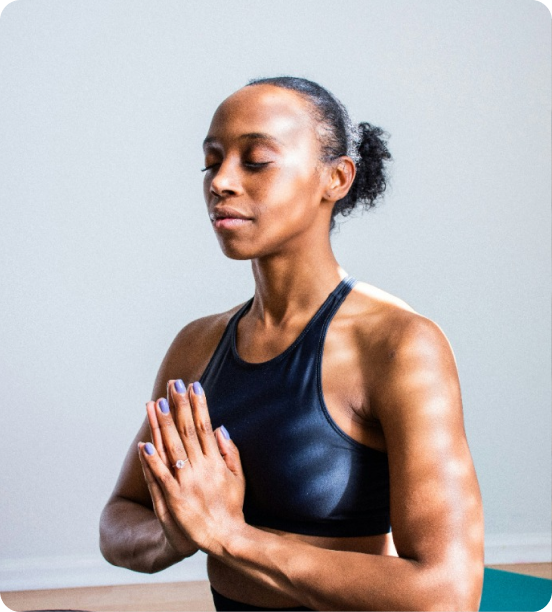Our Services

Hatha Yoga
Meaning: Hatha yoga is a traditional branch of yoga that focuses on physical postures (asanas), breath control (pranayama), and meditation to achieve a balance between mind and body.
Benefits: Improves flexibility, strength, balance, reduces stress, enhances mental clarity, and promotes overall well-being.
Cautions: Beginners should practice under the guidance of a qualified instructor to avoid injuries.
Concerns addressed: Addresses physical and mental wellness through a holistic approach, promoting harmony between body and mind.

Ashtanga Yoga
Meaning: Ashtanga yoga is a dynamic and physically demanding form of yoga that follows a specific sequence of postures combined with synchronized breathing.
Benefits: Builds strength, flexibility, endurance, improves concentration, detoxifies the body, and promotes mental focus and discipline
Cautions: Beginners should start slowly and gradually increase intensity to avoid strain or injury. It’s important to listen to the body and not push beyond one’s limits.
Concerns addressed: Addresses physical fitness, mental discipline, and spiritual growth through a structured and disciplined practice.

Power Yoga
Meaning: Power yoga is a vigorous and fitness-oriented style of yoga that emphasizes strength, flexibility, and stamina through a fast-paced and challenging sequence of poses.
Benefits: Increases muscle tone, improves cardiovascular health, enhances flexibility, boosts metabolism, and promotes weight loss.
Cautions: Practitioners should ensure proper alignment and avoid overexertion to prevent injuries.
Concerns addressed: Addresses the need for a dynamic and intense workout while incorporating the principles of yoga for overall fitness and well-being.

Iyengar Yoga
Meaning: Iyengar yoga focuses on precision and alignment in each posture using props such as blocks, straps, and blankets to assist practitioners in achieving correct alignment.
Benefits: Improves posture, flexibility, balance, strengthens muscles, alleviates chronic pain, and enhances body awareness.
Cautions: Practitioners should pay close attention to alignment to prevent strain or injury, especially if dealing with existing physical limitations.
Concerns addressed: Iyengar yoga emphasizes safe and precise alignment to ensure maximum benefits and minimize the risk of injury.

Vinyasa yoga
Meaning: Vinyasa yoga is a dynamic style of yoga that synchronizes movement with breath, flowing seamlessly from one pose to another in a continuous sequence.
Benefits: Increases cardiovascular health, builds strength, improves flexibility, enhances coordination, and promotes mindfulness and relaxation.
Cautions: Practitioners should maintain awareness of breath and alignment to prevent strain or overexertion. Beginners may need to start with slower-paced classes.
Concerns addressed: Vinyasa yoga provides a fluid and energizing practice that integrates breath and movement, promoting physical and mental well-being.

Prenatal Yoga
Meaning: Prenatal yoga offers tailored practices for pregnant women, focusing on physical health, stress reduction, and childbirth preparation.
Benefits: It helps alleviate discomfort, enhances circulation, strengthens muscles crucial for labor and fosters relaxation.
Cautions: Pregnant women should avoid certain poses and consult their healthcare provider before starting prenatal yoga to ensure safety.
Concerns addressed: This specialized yoga form addresses the unique needs of expectant mothers, providing a safe and supportive environment to navigate the physical changes and emotional journey of pregnancy.

Children & Teenager Yoga
Meaning: Children and teenager yoga is a branch of yoga focusing on physical postures (asanas), breath control (pranayama), and relaxation techniques to support the growth and well-being of young individuals.
Benefits: Improves flexibility, strength, coordination, reduces stress, enhances focus and concentration, boosts self-esteem, and promotes overall well-being.
Cautions: Beginners should practice under the guidance of a qualified instructor to avoid injuries.
Concerns addressed: Addresses physical and mental wellness through a holistic approach, promoting harmony between body and mind.

Pranayama
Meaning: Pranayama is a fundamental aspect of yoga that focuses on breath control techniques to regulate and enhance the flow of life force energy (prana) within the body.
Benefits: It improves respiratory function, reduces stress, enhances mental clarity, increases vitality, and promotes overall well-being.
Cautions: Individuals with respiratory or cardiovascular conditions should practice under the guidance of a qualified instructor.
Concerns addressed: Pranayama addresses the vital connection between breath, body, and mind, offering a pathway to balance and harmony while nurturing physical and mental health.
